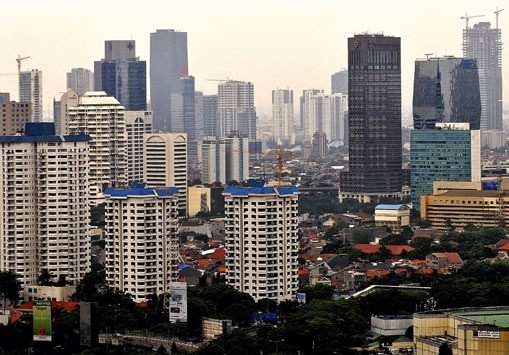Popular Reads
Top Results
Can't find what you're looking for?
View all search resultsPopular Reads
Top Results
Can't find what you're looking for?
View all search resultsKeep calm and do business: Jokowi
Change text size
Gift Premium Articles
to Anyone
B
usinesses should keep calm and continue with their activities amid rising political tension as President Joko “Jokowi” Widodo reassures that there is nothing to worry about.
Speaking during Bank Indonesia’s (BI) annual Bankers’ Dinner on Tuesday evening, Jokowi acknowledged that the country saw rising tension in the political climate following massive protests related to a case of alleged blasphemy of Jakarta Governor Basuki “Ahok” Tjahaja Purnama ahead of the city’s gubernatorial election in February next year.
He said he was preoccupied by political issues, which he previously claimed involved “political actors”, but stressed that there was nothing to worry about.
“I was busy managing [the problem], but it’s actually okay. The tension just gets a little bit warmer whenever there is a regional election. I have experienced it myself during the 2012 [Jakarta] gubernatorial election,” Jokowi said in front of hundreds of bankers, government officials and businesspeople attending the event.
Stressing his confidence, Jokowi said analysts and economists should not contribute to the rising political tension by commenting irresponsibly and called for businesspeople to remain calm.
“We [Indonesians] seem to like gossip and rumors as we tend to exaggerate trivial things. It is an obstacle for us to be optimistic. Indonesia ranks second after China as the most optimistic country according to a recent survey, but the fact is, we sometimes appear pessimistic,” he said.
Jokowi also asked bankers and businesspeople to remain optimistic about the economy as he downplayed the rising global uncertainty following the unexpected victory of US president-elect Donald Trump, who promised protectionism and expansive growth by bringing back jobs to his country.
Global markets have reacted to the rising possibility of the US Federal Reserve’s plan to raise its fund rate sooner to anticipate expansive economic growth, but Jokowi said Trump remained a businessman who would not be reckless with a policy that could damage the world economy.
With such confidence, he said the government would continue its ongoing efforts to improve the domestic economy by stressing three main things: fighting illegal levies, cutting bureaucratic red tape and accelerating infrastructure development, which has been supported by the reallocation of fuel subsidies into more productive sectors.
Gross domestic product (GDP) growth in Southeast Asia’s largest economy slowed to 5.02 percent in the July to September period, lower than the 5.19 percent in the previous quarter because of declining government spending and exports.
Meanwhile, BI Governor Agus Martowardojo pointed out three major potentials in the domestic economy that could be enhanced to support resiliency, namely a realistic and mediumlong term fiscal policy, a higher-thanexpected result of the tax amnesty and digital economy development.
Agus also stressed the importance of maintaining stability amid rising global uncertainty while at the same time supporting economic growth directly or indirectly through the central bank’s monetary policies.
The central bank has prepared several new measures for next year, particularly in the area of monetary operations by introducing “averaging-primary reserve requirement (GWM)” and enhancing government debt papers (SBN) as a monetary instrument.
The new GWM policy is expected to help banks become more flexible in managing their liquidity as they will be allowed to maintain the average GWM ratio in a certain period only, as opposed to 6.5 percent at the end of the day.
Bahana Securities economist Fakhrul Fulvian said the averaging GWM could help banks solve the tight liquidity issue because they would not need to pay GWM on a daily basis, creating more room for their loan disbursements.










